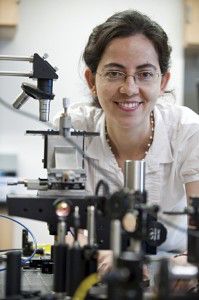
Hatice Altug, a Boston University professor of electrical and computer engineering, said working in nanophotonics has enabled her to examine light in ways never seen before.
“You can do manipulation of light in a way that you cannot do at the micro- or macroscales,” she said. “We use particles, small metallic nanostructures, which basically helps us to manipulate light on the chip at the nanoscale.”
The Optical Society of America named Altug the Adolph Lomb Medal recipient on Thursday. The Adolf Lomb Medal, established in 1940, is presented to doctors under 35 who have made notable contributions to optics and is one of several awards presented throughout the year, said OSA Communications Director Angela Stark.
Altug, who has worked in the College of Engineering since January 2007, researches in the field of photonics. The professor said she aims to develop technology based on light at the nanoscale.
“This is a very prestigious award,” said M. Selim Unlu, associate dean for research and graduate programs in electrical and computer engineering, the program within ENG in which Altug works. “It is a predictor of great scientific achievement, ”
Unlu described previous winners of the medal as “visionaries” in the field.
“We never doubted that [Altung] is a pioneer and is destined to be leader in photonics research,” Unlu said. “Now, the Optical Society of America has confirmed with this award her special place among many successful young researchers.”
Stark said the review process for OSA awards is “rigorous.” A nomination form must be submitted, after which a selection committee evaluates each nominee and then the Board of Directors must approve the committee’s decision.
Altug and her team have worked to develop new and advanced biodetection and spectroscopic technologies in the biomedical field.
“In the lab, we work to develop technologies to detect infectious pathogens like viruses or infectious diseases,” she said. “We are more interested in technologies that can do detection and get results very quickly, as opposed to waiting days.”
The technologies they aim to develop are expected to be low-cost, portable and affordable, Atlug said.
Atlug, who also received a grant from the National Science Foundation to study proteins, _works on detecting and understanding proteins in her lab.
“Proteins are very important for cell functions,” she said. “They’re basically the machines that do all the work. It is very important at the fundamental level [to learn] how proteins are doing their job, what affects their functionality.”
Atlug and her team are developing new technologies that are nano-technology based platforms that can help to understand the functionality of the proteins.
“This is important because if you understand the functionality, some proteins serve as markers for diseases, such as cancers and Alzheimer’s,” she said. “They can be indicative of your disease status.”
Altug said she received the medal for her work developing platforms for this technology. It was very innovative and attracted attention.
“We were one of the first ones to harness these nanostructures for a real application,” she said. “For example, for development of nanosensors for infectious diseases. We started to interact with the biologist and virologists.”
Altug said she wanted to apply her knowledge to make a meaningful contribution society.
“The technologies we’re trying to develop are very ambitious,” she said. “They are quite big, multidisciplinary and broad. It’s ambitious, but the impact could be big.”
The award acknowledges the culmination of Altug’s work, she said.
“This award, you don’t specifically get for one little thing,” Altug said. “I guess they look at the accumulation, what happened since you start your Ph.D all the way through. So that’s 12 years since I came to the U.S. and started my Ph.D.”























































































































